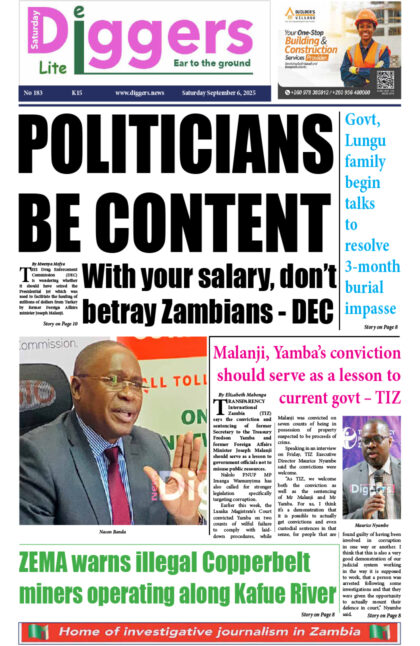Government has defaulted on its commitment to pay LapGreen Network an excess of US$382 million in compensation, following a consent judgement order entered into between the Libyan firm and the Republic of Zambia.
And FDD deputy national secretary Antonio Mwanza says he has information to the effect that LapGreenN is threatening to seize Zambia’s assets abroad over the debt which is overdue.
This is a case were LapGreen of Libya sued the Zambian government after it forcefully takeover LapGreen shares in Zamtel in 2012.
LapGreenN bought 75 per cent shares in Zamtel during former president Rupiah Banda’s reign at US$252 million, a price which the Michael Sata led PF government described as ridiculous.
After repossessing LapGreenN shares, government went further to launch a manhunt for Banda’s son Henry who was accused of taking a staggering commission from the sale.
LapGreenN however, took legal action against the move by government in the Lusaka High Court. The State failed to defend itself and instead entered a consent settlement to compensate LapGreen it’s initial investment of US$252 million plus interest, calculated at eight per cent.
Mwanza told News Diggers that the Zambian government had defaulted on the repayment of the compensation.
“According to the settlement agreement, the Zambia government was supposed to make an initial payment of US$114 million in November 2016, followed by biannual payments of US$35 million in February 2017 and August 2017 respectively. However, the government has defaulted and LapGreenN is now threatening to take all measures possible to recover their money including taking the issue to the International Arbitration Court and seizing Zambia’s assets abroad,” Mwanza said.
“This issue raises serious questions with regards to Zambia’s capacity to repay the ballooning debt that our country finds itself in and the claims by Government that Zambia’s economy is recovering. How can one claim that Zambia’s economy is recovering when Government is failing to meet its statutory financial obligations?
The implications of the actions that LapGreenN is about to undertake have far reaching consequences with regards to Zambia’s standing on the global financial market especially now that the country is negotiating to get a loan of US$1.6 billion dollars from the IMF. Eurobonds and other debts are also approaching their maturity repayment dates and we have a widening fiscal deficit as a country. Does Zambia have the capacity to service the ever increasing public debt when it is failing to pay such financial obligations as compensation?”
He asked government to give the Zambian people a clear explanation on the matter.
“Can government explain to the Zambian people what the status of this matter is. What happened to the initial US$252 million that LapGreenN paid the Zambian Government? Can the Minister of Finance confirm that the LapGreen debt was added to Zambia’s total public debt which he stated in Parliament? How much debt has Zamtel accrued from the time Government took over its operations? And how much of this debt has been granted by government? Can the Minister in charge of Transport and Communication explain to the Zambian people how Zamtel is performing since the government’s take over. We demand an honesty and comprehensive response from government.”
Mwanza questioned how government spend the money paid by LapGreenN when it bought shares in Zamtel.
“It is common knowledge that Zamtel in its current state is moribund and it is only surviving through government borrowings and guarantees. The questions that needs serious answers is why did the PF government illegally grab Zamtel, knowing very well that that it had no capacity to efficiently run the entity? What happened to the initial US$252 million that LapGreen injected into Zamtel because the company is limping,” said Mwanza.
“The consequences that we as a country is likely to suffer if this matter and the general public debt management problems escalates are too ghastly to contemplate. As punishment for default, capital markets will either impose punitive borrowing rates or refuse to lend at all. And credit-rating agencies will no doubt warn against investing in the country. This issue may appear minute but it is a serious time bomb that if left unresolved will have serious ramifications on the country’s international standing. Let Government explain to the public how it plans to settle this issue before it gets out of hand.”























